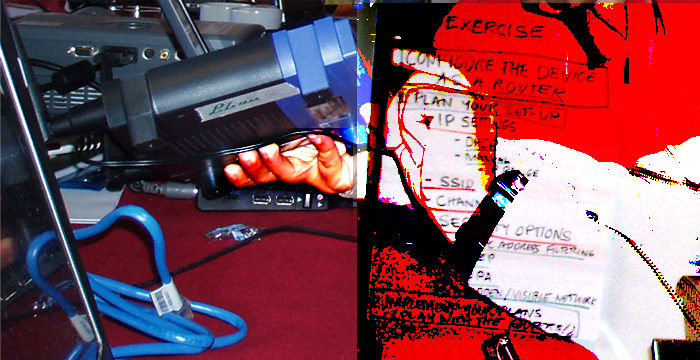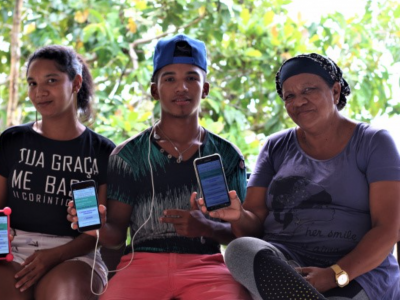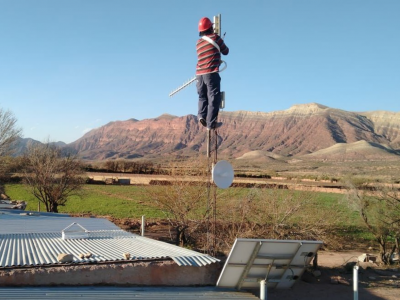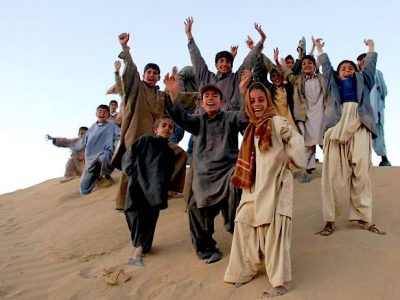
Image by Kathleen Diga for GenderIT.org.
This newsletter is part of the project titled, “Local Access Networks: Can the unconnected connect themselves?” developed by APC in partnership with Internet Society and Rhizomática, with support from Canada's International Development Research Centre (IDRC). It is republished here on Rising Voices as part of a partnership with APC. Click here to see the original post on APC's website.
1. Get involved
- Digital Empowerment Foundation is calling for sessions for their Digital Citizen Summit. The deadline to submit your session proposal is 30 April 2018. Read more.
2. Calls for grants
- The Beyond the Net Medium and Large Grants Programme is now open for applications until 15 May 2018. Read more.
- USAID’s WomenConnect Challenge is seeking comprehensive solutions that empower women and girls to access and use digital technology to drive positive health, education and livelihoods outcomes for themselves and their families in countries with a USAID presence. The funding available is for 10 grants totalling USD 1,000,000 and the deadline for applications is 4 May 2018. Read more.
- [En español] En su convocatoria de este año, el Fondo Regional para la Innovación Digital en América Latina y el Caribe (FRIDA) pondrá énfasis en proyectos de redes comunitarias y en iniciativas que promuevan la equidad de género en tecnología, otorgando USD 95 mil en premios, subvenciones y escalamientos. El llamado para la presentación de los resúmenes ejecutivos de los proyectos postulantes para apoyar innovaciones en la región de LACNIC estará abierto hasta el martes 15 de mayo de 2018. Se ofrecerán tres premios de USD 5,000 más una beca para participar en el Foro Gobernanza de Internet 2018; tres subvenciones de USD 20,000 cada una y un escalamiento de USD 20,000. Leer más.
3. Events and conferences
3.1 Upcoming events
- “State of Our Networks – Beyond DIY: Do it for others” is taking place 13-18 July 2018 in Toronto, Canada. Read more.
- The re:publica session “How the unconnected are connecting themselves” will take place on 3 May 2018 at 12:30 (Berlin time). Read more.
- This year the “Wireless Battle of the Mesh” and the “Wireless Community Weekend” have joined forces to create a new event, called “Mesh is in the Air”, merging the best of both events and co-located in Berlin from 7 to 13 May 2018. Read more.
- The Africa Internet Summit (AIS) is taking place 5-11 May in Dakar. Last year AIS hosted the 2nd Summit on Community Networks in Africa, which this year will happen in September. Community networks will also be covered during the Afchix Summit. Read more.
- The Global Summit of the Dynamic Spectrum Alliance will take place in London from 1 to 3 May 2018. The publication of the TVWS regulations in South Africa will no doubt bring movement into this space! Read more.
3.2 Resources from past events
- The Indigenous Connectivity Summit, held 8-9 November 2017 in New Mexico, was the first Internet Society meeting to focus on connecting North American Indigenous communities to the internet. Here is the report coming out of this event, which gathered about 200 participants in-person and online for a two-day series of panels, presentations and open discussions examining community networks in North America and abroad. Read more.
- [En español] Resumen de Altermundi sobre su participación en la Cumbre Mundial sobre la Sociedad de la Información. Leer más.
4. Community networks in news and blogs
- Tribes building their own fiber in Alburquerque. Read more.
- How the Lenca people in Honduras are restoring the past to build their future. Read more.
- The use of electricity cooperatives to be the hub of broadband network in New Mexico. Read more.
- Viasat launches satellite Wifi service in Mexico. Read more.
- Tanzania is starting to work on piloting use of TV white space for internet. Read more.
- TunapandaNET is a low-cost community wireless network championed by Tunapanda Institute in Kenya. Read more.
- Empowering local communities to build, maintain and expand their community networks. Here is the story of Sarantaporo, a small village located in central Greece. Read more.
- A 5G community network strategy for Cuba (and other developing nations). Read more.
- Gender and community networks: Candid reflections 10 years later. In this new GenderIT.orgcolumn on community networks and gender, the writers will explore how communities can provide and run their own internet infrastructure, the existing forms of community networks, the legal and policy environment in which they have to exist and what the gender dynamics are around these networks. The first column by Kathleen Diga asks a fundamental question: What would be the costs of women not having access? It also explores how community networks allow for the re-imagining of many social relations around infrastructure. Read more.
- In this episode of the TechCentral podcast, Duncan McLeod talks to Carlos Rey-Moreno of APC about the work he and his team have done to help deliver cheap telecommunications services to the rural people of Mankosi and surrounding areas in the Eastern Cape in South Africa. Read more.
- Members of the community of Cortez, Colorado are going to be enacting a new Fiber-to-the-Home pilot project after the city council unanimously approved the measure. Members of this rural community will now benefit from high-speed, high-quality internet access. Read more.
- [En español] Conoce más sobre Rodrigo Troian, un joven brasileño que visita diversas comunidades de las regiones norte y noreste de su país para instalar redes comunitarias a través de un sistema de micro-créditos. Leer más.
- [En español] Entrevista con Sebastian Bellagamba, director para América Latina y el Caribe de Internet Society, para ampliar sobre los desafíos en materia de políticas regulatorias para reducir la brecha digital en la región: “Hay que buscar soluciones innovadoras para conectar a los desconectados”. Leer más.
- [En español] Medios comunitarios indígenas, a la vanguardia. Leer más.
- [En español] Construcción de infraestructura comunitaria, por Christian O'Flaherty. Leer más.
- [En español] Redes comunitarias para la memoria, en el blog de Altermundi. Leer más.
- [En español] De autonomía y redes comunitarias en México, por María Alvarez Malvido. Leer más.
5. Relevant articles on technologies related to local access networks
- New Zealand's most remote residents connected by pioneer mini web providers. Read more.
- With the publication of the TV white space regulations in South Africa, there has been a lot of movement around the topic:
- Informative podcast interview with Roger Hislop, a senior research engineer, who breaks down the concept of TV white space. We suggest you listen to it if you want to learn more about this technology! Read more.
- A rural clinic in South Africa is using TV white space to connect medical staff for the use of electronic records. Read more.
- Unveiling a not that well-known TVWS pilot in Swaziland, which is apparently the biggest in the world. Read more.
- An overview from Steve Song on the history that led to these regulations. Read more.
- Mobile operators in South Africa not using their spectrum, something that could open the door for community networks utilising that spectrum. Read more.
6. Regulation
- Regulations on the Use of Television White Spaces 2018, South Africa. Read more.
- The Pakistan Telecommunication Authority (PTA) has prepared the “Spectrum Sharing Framework” aimed at using the existing spectrum more efficiently, moving beyond simple frequency or spatial separation. Read more.
- [En español] Otorgan amparo a las telecomunicaciones de comunidades indígenas en México. Leer más. También compartimos informe de Observacom al respecto: Instituto Federal de Telecomunicaciones de México deberá revisar su decisión sobre pago de derechos por uso de espectro a asociación indígena. Leer más.
- [En español] El Poder Judicial de la Federación otorga histórico amparo a Telecomunicaciones Indígenas Comunitarias A.C. Leer más. Compartimos el enlace a la resolución judicial. Leer más.
7. Reports and publications
7.1 Reports relevant to community networks and local access initiatives
- WSIS Forum 2018: High-Level Track Outcomes and Executive Brief. Read more.
- WSIS Forum Summary Report prepared by the Geneva Internet Platform, with support from ICANN, the Internet Society and DiploFoundation: Extending the debate. Read more.
- Mozilla highlights community networks within the “New approaches to rural internet connectivity” in their Internet Health Report 2018. Read more.
- First Mile Connectivity Consortium (2018). Stories from the First Mile: Digital Technologies in Remote and Rural Indigenous Communities. This book is a celebration of the achievements of remote and rural Indigenous communities associated with the First Nations Innovation research project (2005-2018), and the First Mile Connectivity Consortium (2013-ongoing). Read more.
- Closing the investment gap: How multilateral development banks can contribute to digital inclusion. Even though the report does not refer directly to community networks, it does provide some pointers in the right direction. Read more.
- [En español] Comunicaciones de emergencia: guía rápida para radios comunitarias. Leer más.
7.2 Academic publications on community networks
- Luca Belli writes about “when building the internet becomes a right”. Read more. And a video link to its presentation at IETF 101 here.
- Selimi, M., Kabbinale, A. R., Ali, A., Navarro, L., & Sathiaseelan, A. (2018). Towards Blockchain-enabled Wireless Mesh Networks. arXiv preprint arXiv:1804.00561. Read more.
8. Previous editions
- Previous editions of this newsletter are available here.
One more thing! If you have comments about the newsletter or information relevant to the topic that you would like us to include in the next edition, please share it with us at localaccess.newsletter@apc.org.



